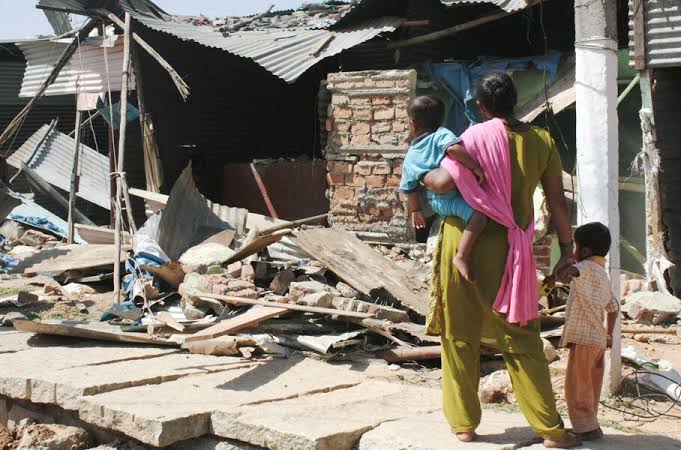
From 2017 to 2019, across urban and rural India, Housing and Land Rights Network (HLRN) found over 117,770 houses demolished and more than 568,000 people forcibly evicted from their homes by the state authorities.
At an online event on Tuesday, HLRN launched its new report on ‘Forced Evictions in India in 2019: An Unrelenting National Crisis.’ The report documents forced evictions in India over the last three years, highlights the severe and long-term human rights impacts on affected persons, and makes recommendations to the government to address this serious but silent crisis of forced evictions and demolitions of homes of low-income communities.
On average, about 190,000 people evicted from their homes every year and at least 108 houses demolished daily, the report says.
About 519 people lost their homes every day and at least 22 people evicted every hour in the country.
The report claims that currently, nearly 15 million people live under the threat of eviction and displacement in India.
Evictions were carried out for a range of reasons and under various guises, including: ‘slum-clearance encroachment-removal city-beautification’ drives [46 per cent of affected people]; infrastructure and ostensible ‘development’ projects [27 per cent]; environmental projects, forest protection, and wildlife conservation [17 per cent]; ‘disaster management’ efforts [7 per cent]; and other reasons such as political rallies [3 per cent of the total affected population].
In nearly all of the documented cases of forced eviction, the HLRN report accused state authorities of not following due process established by national and international human rights standards.
Resettlement was provided in only about 26 per cent of the documented cases of eviction in 2019 for which information is available [29 per cent of the recorded incidents in 2018 and 2019]. In the absence of resettlement for the vast majority, affected persons have had to make their own provisions for alternative housing or have been rendered homeless. For those who received some form of resettlement from the state, the sites they have been relocated to are remote and devoid of adequate housing and essential civic and social infrastructure facilities.
All incidents of forced eviction documented by HLRN have resulted in multiple, and often gross, human rights violations. Children, women, persons with disabilities, older persons, Dalits, Adivasis, and other marginalized groups have suffered disproportionately from the loss of their homes and habitats.
The report observed that through these persistent acts of eviction and demolition of homes, central and state government authorities have violated national laws, policies, and schemes and international laws and norms and the majority of evicted people do not have access to justice and their right to effective remedy has not been fulfilled.
In 2019, court orders, including of High Courts, estate courts, and the National Green Tribunal, were responsible for the eviction of over 20,500 people.
The release of HLRN’s report was followed by a panel discussion with Dr Usha Ramanathan (researcher on the
jurisprudence of law, poverty, and rights), Mr Miloon Kothari (former United Nations Special Rapporteur on Adequate Housing), Dr Amita Bhide (Professor and Dean, School of Habitat Studies, Tata Institute of Social Sciences), and Ms Shivani Chaudhry (Executive Director, Housing and Land Rights Network) – all of whom
discussed the gravity of the national eviction crisis and raised questions related to state accountability and
violation of the law.
Housing and Land Rights Network strongly condemned the continued occurrence of forced evictions and demolition of homes of low-income and marginalized communities.
It calls on the states to impose and immediate national moratorium on evictions.
Provide adequate rehabilitation, consistent with international standards, including compensation for material and non-material losses, and support evicted families to rebuild their homes at the same site if vacant, or provide adequate alternative housing with basic facilities within a vicinity of 2–3 kilometres and investigate all acts of forced eviction and fire in ‘informal settlements’ – according to the law, HLRN demanded.
It also urged to pass housing rights legislation that upholds the human right to adequate housing, as guaranteed in international law.
Focus on the ‘Housing First’ approach prioritizing the provision of homes to homeless persons and families, the report recommended the state authorities.
The report also reads: “Forced evictions not only violate human rights laws, but also reflect a continuing systematic dispossession of the poor. Persistent acts of home demolition and eviction directly contribute to a rise in homelessness, landlessness, displacement, impoverishment, and income inequality. Affected persons suffer multiple human rights violations as well as a considerable deterioration in their standard of living. This adversely impedes human development and national progress. The COVID-19 pandemic has reiterated the importance of adequate housing as a key
determinant of health, safety, and life. Any state that is concerned about economic and social justice, and is serious about meeting its legal obligations must uphold the right to housing of its people, including addressing on an urgent basis, the crisis of forced evictions.”



